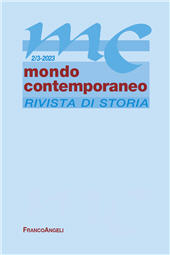Dalla "condizione della donna" alla prospettiva di genere : bilanci e interpretazioni nel centenario della marcia su Roma
52-77 p.
In occasione del centenario della marcia su Roma numerose sono state le iniziative e le ricerche sul regime instaurato da Mussolini, ma scarsa è stata l'attenzione a quanto prodotto dalla storia delle donne e dalla storia di genere. Il saggio propone una ricognizione sui principali percorsi di analisi e sui risultati ottenuti da questo filone di indagine che nel corso di cinquant'anni ha portato un significativo avanzamento nella conoscenza storica. L'ottica di genere è stata utilizzata per mettere a fuoco il soggetto femminile: dalle forme di mobilitazione di massa alle attività lavorative, dalle politiche a sostegno della battaglia demografica a quelle sui consumi in regime di autarchia, alla ridefinizione dei ruoli assegnati alla madre e al padre all'interno della famiglia.
Successivamente questo approccio, dichiaratamente inclusivo, ha consentito di guardare ai rapporti tra i sessi, alle rappresentazioni maschili e femminili nei territori metropolitani e in quelli coloniali, alle dinamiche di potere e alle contraddizioni del sistema patriarcale fascista restituendo un quadro più ricco e articolato della vita degli italiani tra le due guerre. [Testo dell'editore].
On the occasion of the centenary of the March on Rome, there have been nume-rous initiatives and research projects on the regime established by Mussolini, but little attention has been paid to what has been produced by the women's history and gender history. The essay proposes a survey of the main paths of analysis and the results obtained by this strand of investigation, which in the course of fifty years has led to a significant advancement in historical knowledge. The gender perspective has been used to focus on the female subject: from mass mobilisation to labour activities, from policies supporting the demographic battle to those on consumption under autarchy, and the redefinition of the roles assigned to mother and father within the family.
Subsequently, this avowedly inclusive approach made it possible to analyse gender relations, male and female representations in metropolitan and colonial territories, and the power dynamics and contradictions of the fascist patriarchal system, thereby returning a richer and more articulated picture of the life of Italians between the two wars. [Publisher's text].
-
Articoli dello stesso fascicolo (disponibili singolarmente)
-
Informazioni
Codice DOI: 10.3280/MON2023-002005
ISSN: 1972-4853
PAROLE CHIAVE
- Storia delle donne, storia di genere, fascismo, dibattito storiografico, interpretazioni del fascismo, centenario della marcia su Roma
- Women's History, Gender History, Fascism, historiographical debate, interpretations of Fascism, centenary of the March of Rome


